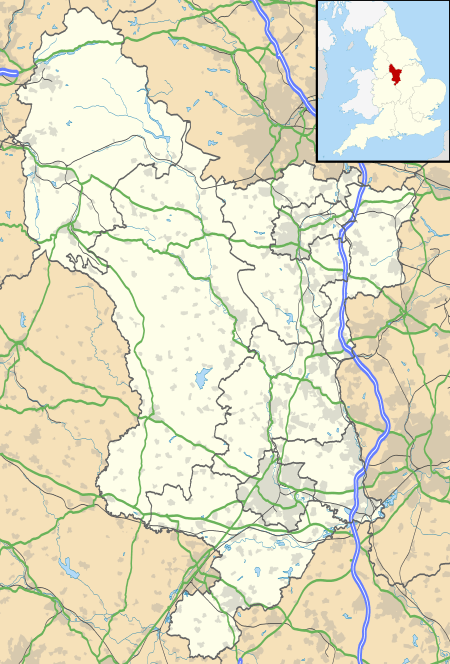Walton-on-Trent
Walton-on-Trent is a village and civil parish in the National Forest in Derbyshire, England. The population of the civil parish as taken at the 2011 Census was 872.[2] As its name implies it is an ancient crossing point of the River Trent. It was at this point that King Edward II crossed the river in pursuit of the disaffected barons including the Earl of Lancaster. Listed buildings in the parish include Catton Hall, Walton Hall and The Old Hall house. Today the village is very close to Burton upon Trent).
| Walton-on-Trent | |
|---|---|
Walton is in the National Forest'[1] | |
 Walton-on-Trent Location within Derbyshire | |
| Population | 872 (2011)(census) or 891 (2018)(estimate) |
| OS grid reference | SK216180 |
| Civil parish |
|
| District | |
| Shire county | |
| Region | |
| Country | England |
| Sovereign state | United Kingdom |
| Post town | SWADLINCOTE |
| Postcode district | DE12 |
| Police | Derbyshire |
| Fire | Derbyshire |
| Ambulance | East Midlands |
The Bridge at Walton
The original bridge was built in 1834 and lasted for over one hundred years before being replaced in 1948 by a temporary Bailey bridge. This was erected by the Royal Engineers over the top of the old bridge, part of which was removed to allow a support to be built on the Staffordshire bank of the river, the temporary bridge had to be built due to flood damage to the old bridge after the severe winter of 1947. This bridge had to again be replaced in 1974 by a more modern version of the temporary bridge. The old bridge was a toll bridge for many years and pictures of the "old bridge" and the toll house are still available.
The Church
St Lawrence's Church, Walton-on-Trent church proudly boasts its founding as “c.1000” on the sign by its Lychgate. At about that time it would have been in the ownership of Aelfgar, an Anglo-Saxon who also had interests which included manors at Weston-on-Trent, Newton Solney and Repton. It is his name that is given as the former owner of Walton-on-Trent's church, mill, 40 acres (160,000 m2) of meadow and 35 square furlongs of pasture[3] when the new king took them as part of his personal reward for winning the English crown.[4]
The village has a Church of England school.
Catton Hall
Catton Hall gives its postal address as Walton on Trent although there was a village of Catton at one time.[3] Catton Hall is owned by the Neilson family, descendants of Anson-Horton family, who themselves were descendants of the Fifth Baronet, Rev. Sir George Wilmot-Horton.[5] The Hall is now available for private functions and horse trials. The hall has been there since the 15th century but the current building was founded in 1745.[6] Annually, Catton Hall hosts heavy metal festival Bloodstock Open Air featuring prominent bands such as Children of Bodom, Opeth, and Nightwish.
References
- Image from Wikimedia Commons June 2007
- "Civil parish population 2011". Neighbourhood Statistics. Office for National Statistics. Retrieved 2 April 2016.
- The Domesday book
- William divided up England village by village and gave theses to those Normans who had assisted him. He personally took a modest list which included Walton on Trent (then called Waletune) and other important manors like Bakewell, Melbourne, Wirksworth and Ashbourne.
- Roger de Horton, Derbyshire Hortons, rootsweb.com
- Catton Hall